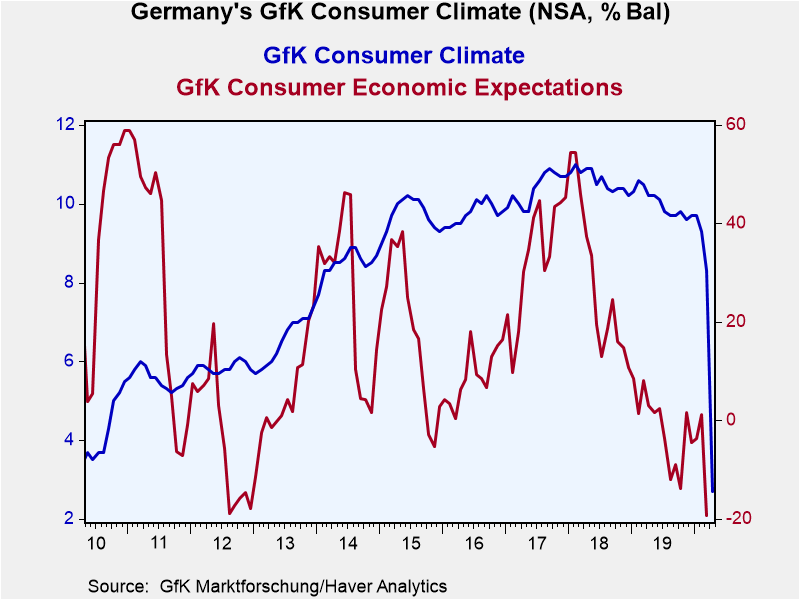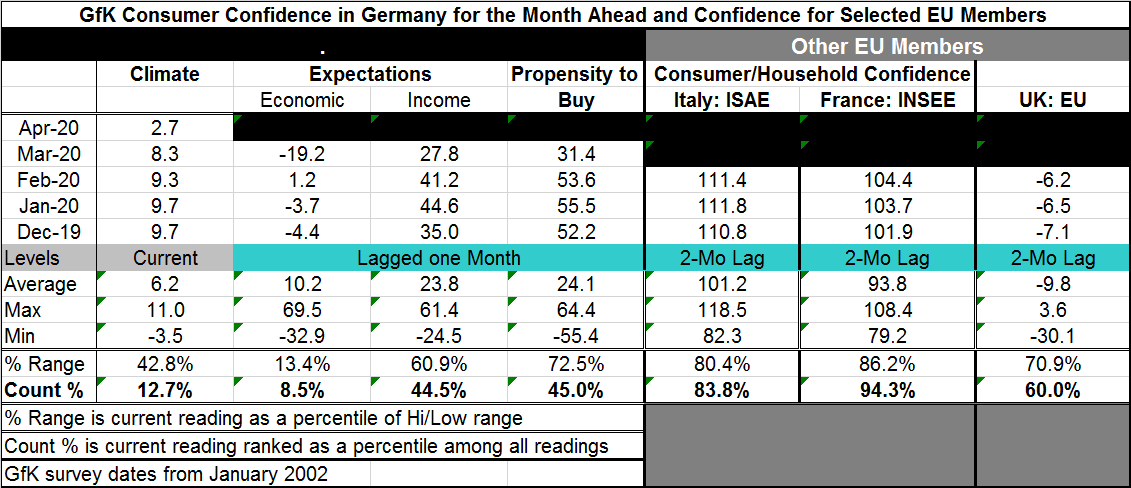 Global| Mar 26 2020
Global| Mar 26 2020German Confidence Blasted to Smithereens for April
Summary
While Angela Merkel's conservative party is rising in the polls for its crisis management skills, the German economy and the German public are nonetheless experiencing greatly deteriorating conditions and expectations. GfK's look- [...]
 While Angela Merkel's conservative party is rising in the polls for its crisis management skills, the German economy and the German public are nonetheless experiencing greatly deteriorating conditions and expectations. GfK's look-ahead consumer confidence poll has plummeted to 2.7 for April from 8.3 in March. What began as a demonstrable step down on confidence in February and March has now become a rout. The plunge in the index, a drop of 5.6 points is severe and the biggest month-to-month drop on record. The second largest drop was a month-to-month fall of 3.8 points in February 2007.
While Angela Merkel's conservative party is rising in the polls for its crisis management skills, the German economy and the German public are nonetheless experiencing greatly deteriorating conditions and expectations. GfK's look-ahead consumer confidence poll has plummeted to 2.7 for April from 8.3 in March. What began as a demonstrable step down on confidence in February and March has now become a rout. The plunge in the index, a drop of 5.6 points is severe and the biggest month-to-month drop on record. The second largest drop was a month-to-month fall of 3.8 points in February 2007.
This March finds declines in all components plus the headline lower (components are up to date only though March). The components are economic expectations, income expectations and Buying climate. There have been only 16 of these coincident monthly drops since February 2002 occurring 7% of the time. At the time of the previously largest monthly GfK drop in February 2007, the outsized decline was mostly on the back of deteriorated buying conditions which fell sharply. This month, of course, the report is still missing the components for April, but the March components are degraded across the board with unusual double-digit declines in all three components. This has happened only once before, in November 2002. There have been seven episodes of two components falling by double digits in the same month.
On balance, the deterioration in Germany is severe. The other EMU reporters in the table are still not up-to-date with readings and at this time having a topical reading is crucial for comparison and tracking.
The GfK standing dropped very suddenly to its low 12.7 percentile reading in April. In the rest of the European data in the table, up-to-date through February, readings are still lollygagging in their respective 60th to 90th percentiles. But degraded readings are coming there soon. We are now in the teeth of the storm and economic data are going to be painful to analyze. Remember this weakness is all self-induced by government edicts to slow the spread of the coronavirus. That makes them potentially quite reversible. But the risk of permanent damage grows the longer that artificial restraints are maintained.

Robert Brusca
AuthorMore in Author Profile »Robert A. Brusca is Chief Economist of Fact and Opinion Economics, a consulting firm he founded in Manhattan. He has been an economist on Wall Street for over 25 years. He has visited central banking and large institutional clients in over 30 countries in his career as an economist. Mr. Brusca was a Divisional Research Chief at the Federal Reserve Bank of NY (Chief of the International Financial markets Division), a Fed Watcher at Irving Trust and Chief Economist at Nikko Securities International. He is widely quoted and appears in various media. Mr. Brusca holds an MA and Ph.D. in economics from Michigan State University and a BA in Economics from the University of Michigan. His research pursues his strong interests in non aligned policy economics as well as international economics. FAO Economics’ research targets investors to assist them in making better investment decisions in stocks, bonds and in a variety of international assets. The company does not manage money and has no conflicts in giving economic advice.
More Economy in Brief
 Global| Feb 05 2026
Global| Feb 05 2026Charts of the Week: Balanced Policy, Resilient Data and AI Narratives
by:Andrew Cates






